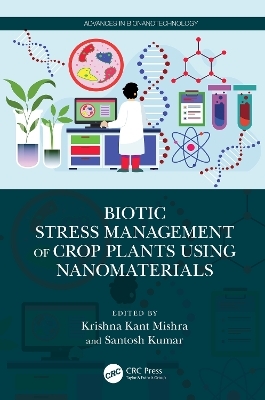
Biotic Stress Management of Crop Plants using Nanomaterials
CRC Press (Verlag)
978-1-032-34431-7 (ISBN)
This book summarizes nanotechnology-based agricultural research for crop productivity and the management of various plant pathogens. It deals with the application of nano-molecules for quick, cost-effective, and precise plant disease diagnostic procedures, plant pests and disease management, nano-pesticides, and nano-diagnostics. Further, it explains nanomaterials for biotic stress management, with an insight into the synthesis and modification of nanomaterials and their potential applications in different domains for disease management.
Features include:
Compilation of current research on the Nanomaterials as well as their versatile applications in plant biotic stress management
Description of the role of nanomaterials as enzyme-mimicking nanoparticles, nano-pesticides, nano-fertilizers, and nanomaterials
Review of day-to-day problems related to crop plants, their diagnostics, and stress management
Exploration of trends in nanomaterial utility in diagnostics, enzyme-mimicking, and crop protection, and their possible role in plant disease management
Study of pertinent nanomaterials including synthetic strategies, properties, chemistry, and applications
This book is aimed at researchers and graduate students in plant pathology, genetic engineering, environmental science, botany, bioengineering, and nanotechnology.
Krishna Kant Mishra is currently working as Principal Scientist and Incharge Head, Crop Protection Division in Indian Council of Agricultural Research (ICAR)-Vivekananda Parvatiya Krishi Anusandhan Sansthan, Almora, Uttarakhad, India. Dr. Mishra received his B.Sc. (Biology) degree from the University of Allahabad, Allahabad, Uttar Pradesh, India with Gold Medal. He obtained his M.Sc. (Plant Pathology) and Ph.D. in Plant Pathology with minor in Molecular Biology and Genetic Engineering from G.B. Pant University of Agriculture and Technology, Pantnagar, Uttarakhand, India. He worked as Junior Research Officer at the Department of Plant Pathology, G.B. Pant University of Agriculture and Technology, Pantnagar, Uttarakhand, India from 2006 to 2010. He was given the P.R. Verma Award by the Indian Society of Mycology and Plant Pathology, Udaipur, India in 2006 for his Ph.D. thesis, as well as the Young Scientist Award by Uttarakhand State Science and Technology Congress in 2011. During his career, Dr. Mishra has published a more than 50 research papers, two edited books, two authored books, three technical bulletins, more than 30 book chapters, 30 extension leaflets, and more than 50 popular articles. He has attended and participated in many local and international workshops and conferences. He was elected the Zonal President-2021, Mid-Eastern Zone by the Indian Phytopathological Society, New Delhi. He has served as a member of organizing committees and as editorial board member and reviewer for a number of scientific journals. Santosh Kumar is currently working as Associate Professor at the Department of Chemistry, Harcourt Butler Technical University, Kanpur, India. He has also served as Research Professor in the Department of Organic and Nano System Engineering, Division of Chemical Engineering, Konkuk University, Seoul, South Korea. Dr. Kumar received his B.Sc. and M.Sc. in Chemistry and D.Phil. in Organic Chemistry from the University of Allahabad, India. He worked as a Research Associate (Council of Scientific and Industrial Research: CSIR) at the Department of Chemistry, Motilal Nehru National Institute of Technology, Allahabad, India. He was awarded a Chinese Academy of Sciences–The World Academy of Sciences (CAS-TWAS) postdoctoral fellowship in 2008 and worked in Changchun Institute of Applied Chemistry, Chinese Academy of Sciences, Changchun, China. Later he joined as a Konkuk University Brain Pool Professor and researcher at the Konkuk University, Seoul, South Korea (2010–2013). He was awarded a Fundação para a Ciência a Tecnologia (FCT) Postdoctoral Fellowship in 2012 and worked at the Chemistry Centre, University of Coimbra, Coimbra, Portugal from 2013 to 2017. During his career, Dr. Kumar has published more than 82 research papers, edited one book and seven book chapters, and attended and participated in local and international workshops and conferences. He has served as a member of organizing committees and an editorial board member and reviewer for a number of scientific journals. He is Associate Editor of the Asian Chitin Journal and is Editor-in-Chief of the Journal of Biological Engineering Research and Review. Current research interests involve source apportionment of chemical modification, optical and biological properties of chitosan biopolymer for biomedical applications, hydrogel, aerogel, nanomaterials, drug and gene delivery, and environmental chemistry.
Chapter 1. Overview of Nanomaterials and their Synthesis. Chapter 2. Nanomaterial as Nano-Pesticides. Chapter 3. Nanomaterials as Nano-Fertilizers. Chapter 4. Natural Biopolymer Nanomaterials in Biotic Stress Management. Chapter 5. Role of Enzyme-Mimicking Nanoparticles in Crop Plants. Chapter 6. Nanomaterial Impact on Genetic Transformation: An Outline. Chapter 7. Nanodiagnostics: Tool for Diagnosis of Plant Pathogens. Chapter 8. Myconanoparticles: Synthesis and Probable Role in Plant Pathogens Management. Chapter 9. Nanotechnology in Biotic Stress Management: Future Challenges and Opportunities.
| Erscheinungsdatum | 17.07.2023 |
|---|---|
| Reihe/Serie | Advances in Bionanotechnology |
| Zusatzinfo | 10 Tables, black and white; 7 Line drawings, black and white; 14 Halftones, black and white; 21 Illustrations, black and white |
| Verlagsort | London |
| Sprache | englisch |
| Maße | 156 x 234 mm |
| Gewicht | 421 g |
| Themenwelt | Naturwissenschaften ► Biologie ► Botanik |
| Technik | |
| Weitere Fachgebiete ► Land- / Forstwirtschaft / Fischerei | |
| ISBN-10 | 1-032-34431-8 / 1032344318 |
| ISBN-13 | 978-1-032-34431-7 / 9781032344317 |
| Zustand | Neuware |
| Informationen gemäß Produktsicherheitsverordnung (GPSR) | |
| Haben Sie eine Frage zum Produkt? |
aus dem Bereich


